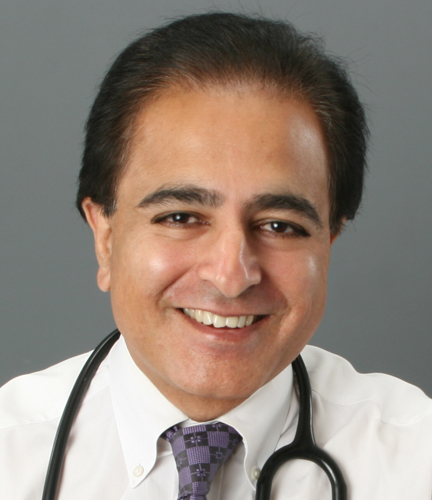Success Story: Small Practice Focuses on Preventive Care and Wellness
Millgrove Medical Center, Audubon, Pennsylvania (2013)
In previous rounds of the Hypertension Control Challenge, Million Hearts® established a benchmark of 70% hypertension control for applicants’ adult populations. This 2013 success story reflects the earlier benchmark.
Nilesh V. Patel, MD, FRCS, has a family practice at Millgrove Medical Center (MMC), which has increased its focus on preventive care and wellness over the past few years, striving to help patients— particularly those with chronic conditions like high blood pressure, also called hypertension—improve their quality of life and overall health. MMC’s motto, “The groundwork of all happiness is health,” underpins its recognition as a 2013 Million Hearts® Hypertension Control Champion. The practice successfully increased its hypertension control rate from 83.4% to 94.9% in just 1 year. Gradual changes, such as putting into action an electronic health record system, helped Dr. Patel and the MMC staff achieve this improvement.
What They Did
Implemented consistent, strategic use of electronic health records (EHRs)
After introducing an EHR system in 2011, MMC made gradual improvements to support patients, such as color-coding the records of patients with hypertension. EHRs now include lab results and medication tracking to streamline care. Additionally, patient-specific educational resources are linked with the EHR, making it easier to tailor communication during each patient’s visit.
- 5,300 adult patients in eastern Pennsylvania are served
- 41% have high blood pressure
- 49% belong to a racial or ethnic minority
- 6% are eligible for Medicaid

“It’s exciting to see patients gain control over their own health. It makes our practice’s focus on prevention worthwhile, even when it’s challenging.”
—Nilesh V. Patel, MD, FRCS, Millgrove Medical Center
Took action to improve medication adherence
Dr. Patel built strong relationships with local pharmacists. These relationships led to open communication; pharmacists called MMC if a patient missed a prescription refill for his or her hypertension medication. This team approach helped Dr. Patel address barriers to medication adherence with patients, making them feel more engaged and cared for. When cost-related barriers arose, Dr. Patel was able to change prescriptions and identify lower-cost options by working closely with pharmacies.
Promoted patient self-measured blood pressure monitoring
Dr. Patel encouraged patients with high blood pressure to purchase a blood pressure cuff for home use. After providing instructions during an office visit on how to take measurements, patients with uncontrolled hypertension checked their blood pressure twice a day at home, recorded readings, and called in their results regularly for inclusion in their EHR. Every 6 months, patients brought their cuffs into the office for comparison readings.
MMC’s dedication and commitment to patient care led to an 11% increase in its hypertension control rate in just 1 year, helping an additional 49 patients reach their target blood pressure and reduce their risk for heart attack and stroke.
Advice for Others
For other small practices focusing on reducing high blood pressure, MMC recommends:
- Persevering even when systems or processes do not work perfectly the first time. It might take a few tries to get things right, but down the road, it will make the work easier.
- Connecting with external support, such as the U.S. Department of Health and Human Services Office of the National Coordinator for Health Information Technology’s Regional Extension Center program. Officers in this program can help with building and using EHR systems and offer encouragement when it feels overwhelming.
- Taking advantage of the data provided in EHRs, such as by creating visuals that show progress over time to review with patients.
Learn More
Shifting to a wellness and preventive care model required adjustment, because patients were used to coming into MMC only when sick. Dr. Patel and his team emphasized how high blood pressure affects all parts of the body (e.g., eyesight and kidney health) to help patients see “the big picture” and the need for regular visits.
